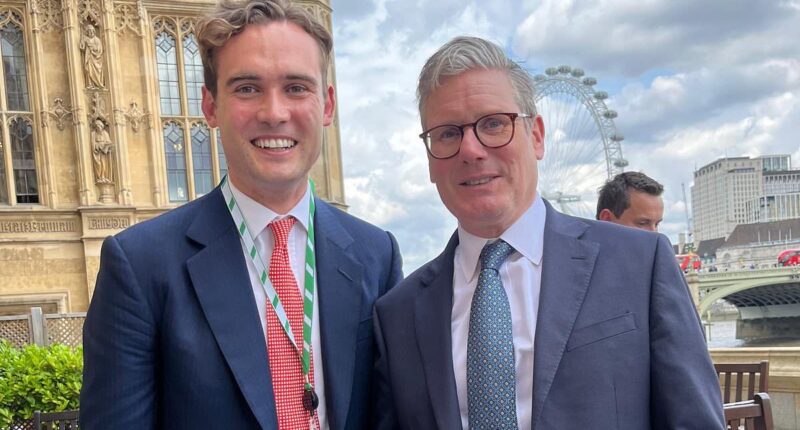Henry Carleton Tufnell, the Right Honourable Member for Mid and South Pembrokeshire, is by some considerable margin Britain’s poshest MP.
The 32-year-old was born in Gloucestershire and raised at Calmsden, a 2,200-acre Cotswold estate that has been in his family since the early 1900s.
Henry grew up in a grand manor called Home, which boasted expansive grounds featuring an arboretum, tennis court, spring-fed swimming pool, and well-kept ornamental gardens highlighted in Cotswold Life magazine. The landscaping was crafted by Alice Keen, the daughter of Earl Howe and the aunt of socialite Cressida Bonas.
His educational journey took him through Radley, a prestigious public school with fees amounting to £57,600 per year. He later attended Brown University, an Ivy League institution, where he excelled as a middle-distance runner for the track and field team.
His father, Mark Tufnell, an alumnus of Eton College, previously held the position of President at the Country Landowners Association until November of last year. This organization, comprising 28,000 members who collectively oversee around 10 million acres of land in Britain, now benefits from his presence on the board of Natural England. Mark Tufnell’s pastimes include conservation efforts for partridges and owls, engaging in country sports (having served as a former chair of the Vale of the White Horse hunt), and involvement in local politics, where he spent multiple years as a Conservative Party councillor.
Mother Jane is no slouch either. A City high-flier, she co-founded investment firm Ruffer, which today has £26.5billion under management, and is a former High Sheriff of Gloucestershire, the local representative of His Majesty the King.
Further up the family tree, things get properly aristocratic. There you’ll find various Baronets, along with Georgian bigwig William Tufnell, whose county estate just north of London was developed into what is now the celebrity enclave of Tufnell Park.
Henry Carleton Tufnell is, in other words, a proper toff. And his victory in this summer’s General Election therefore prompted a gushing tribute from Society bible Tatler, which concluded that the ‘dashing’ new Parliamentarian was far and away ‘the most handsome MP in the country’.

Henry Carleton Tufnell, MP for Mid and South Pembrokeshire, is one of the recent intake of MPs representing Sir Keir Starmer’s Labour, despite his cut-glass accent and Tory credentials
There is, however, a wrinkle to this Bright Young Thing’s journey into politics. For despite his cut-glass accent and impeccable Tory credentials, Tufnell just happens to be one of the recent intake of MPs who represent Sir Keir Starmer’s Labour Party.
Nothing so very wrong with that, you might think. After all, champagne socialists such as Tony Benn and Harriet Harman have for years been jollifying Westminster from the Labour benches, and there is no law dictating that background or class status must determine one’s political views.
Indeed, as David Cameron rightly argued, when the Left was obsessing over his prior membership of the Bullingdon Club, ‘what matters in life is not where you come from, but where you are going to’.
Yet there are times, in today’s fraught political landscape, when the place that you came from come really does affect where your career ends up.
And that brings us to an awkward recent series of events involving the fate of Henry Tufnell MP. Or rather, his stonking family fortune.
The story begins with this year’s Budget and the hugely contentious decision by the Chancellor Rachel Reeves to abolish the Inheritance Tax relief that has for decades allowed farmland to be exempted from death duties.
Her move, which according to Labour grandee John McTernan was motivated by a desire to ‘do to farmers what Thatcher did to the miners’, has caused outrage in rural communities, throwing the financial plans of families who work in agriculture into chaos. Opponents took to the streets of London last week.
The so-called ‘Family Farm Tax’ won’t just affect small working farms, either. In fact, it’s specifically designed to hammer the owners of mega-estates such as Calmsden, the Tufnell family seat.

Henry Tufnell successfully campaigned for election via social media videos about his rural upbringing. In one he declared: ‘I come from a farming background and I have strong connections with rural communities’

With his equally posh wife Poppy Rimington-Pounder, a barrister daughter of two judges who, according to friends, is ‘perfectly nice but slightly more Left-wing than Henry’
Under the new Reeves regime, any land valued at more than £1million will now be taxed at 20 per cent when its existing owner dies.
Since Calmsden occupies 2,200 largely arable acres just east of Cirencester, that 20 per cent could be a very big number indeed. The going rate in the area is around £10,000 an acre, which would make the family’s overall holdings worth north of £20million.
To put things another way, Labour’s recent Budget in theory left the Tufnell family staring down the barrel of a significant liability. Perhaps one of more than £4million.
Theory and practice are two different things, however. For I can reveal that in the weeks leading up to the budget, Henry Tufnell’s parents Mark and Jane took a couple of significant steps that may dramatically reduce their family’s exposure to the party’s tax raid.
The first occurred on October 10 this year, a mere 20 days before Reeves announced her tax plans. It saw them gift ownership of a company called Upper Colne Farm and Stud directly to Henry’s brother Albermarle, 22.
Upper Colne is understood to be a farming business that controls somewhere under a quarter of the Carleton Estate’s overall holdings. In March this year, when it last filed accounts, it listed assets of £2,017,081, of which £1,945,468 was described as being agricultural land.
After the transaction occurred, Albermale – a former point-to-point jockey known to friends as ‘Albie’ – acquired ‘significant control’ of the organisation, owning ’75 per cent or more’ of its shares.
That in turn is highly significant. For under current UK tax laws, death duty will now not be due on Upper Colne Farm and Stud (and the land it controls) as and when Mark and Jane pass away, provided they live past October 2031. That will be seven years from the date on which the change in control was registered.

Henry Tufnell tells Guy Adams: ‘I appreciate that it looks bad, but there’s nothing that I can do about it’
Since Mark is 59 and Jane is 60, a betting man would expect them to more than make the cut.
A second transaction occurred on October 24, or a mere week before the Labour budget. This saw Mark set up a trust, registered as the ‘Tufnell 2024 Settlement’.
Neither the exact nature of this financial vehicle, nor the assets it now contains, are stated on publicly available paperwork. However, I gather from a source close to the family that the trust fund was set up to provide financial support to any children that Henry, Albie, or their daughter Eleanor, 30, might end up having.
That is again significant, because such ‘discretionary trusts’ typically provide a legal tax-efficient way to minimise inheritance and other liabilities by allowing assets to pass directly from grandparents to their grandchildren.
It should be stressed that there is nothing illegal about such inheritance planning, even when it involves relatively elaborate steps such as setting up trusts.
But in politics, where appearances can be everything, the timing of the Tufnell family’s transactions will raise eyebrows.
After all, at the time they went through, Labour’s plans to whack inheritance tax on farmland remained unclear, even though rumours had been circulating in the farming community.
Only a few months earlier, the party’s future Defra secretary, Steve Reed, had promised a conference held by Mark Tufnell’s Country Landowners Association that his party had ‘no plans’ to change the rules. Reeves’s decision to renege on that pledge didn’t leak until just a few days prior to the Budget on October 31.
‘I don’t know a single local farmer who did what Tufnell’s Dad did prior to the budget, because it wouldn’t really have made sense,’ one dairy farmer from Henry’s constituency tells me.
‘Under the old rules, you didn’t need to hand over the land to your children because that could just be done tax free after you’d died. Obviously that has completely changed. Farmers are now desperately trying to pass on their land, but for many of them it’s way too late because they are already in their 70s or 80s and may not live another seven years. They will look at what our MP’s father did and wonder how he acted with such foresight.’
Things are made even more awkward by the fact that Henry Tufnell now sits on the Defra select committee, which oversees agriculture.
The new MP, who worked briefly as both a barrister and trade union officer before entering politics (a fact that he flags on his LinkedIn CV, where that public school education is strangely absent), successfully campaigned for election to the Parliamentary body via a social media video in which he declared: ‘I come from a farming background and I have strong connections with rural communities.’
That was, I suppose, one way to describe growing up on a 2,200-acre Cotswold estate. But playing down his wealth and privilege has been a feature of Henry Tufnell’s entire political career.
In one election leaflet issued during the General Election campaign, for example, the Labour candidate posed with a cow, telling voters: ‘I grew up in a farming family and have spent many Easters lambing and many summers doing the harvest.’
On his campaign website, Henry meanwhile claimed to ‘live just outside St David’s’ saying: ‘I have been coming to Pembrokeshire since I was a small child with my mum, who was born in Pontypridd.’
While technically true, it rather glossed over the fact that the residence where he lived was actually part of a stonking holiday compound adjacent to Whitesands, a popular local tourist beach, which his parents purchased for nearly £600,000 in 2012 and extensively remodelled.
It’s now the constituency home he shares with equally posh wife Poppy Rimington-Pounder, a barrister daughter of two judges who, according to friends, is ‘perfectly nice but slightly more Left-wing than Henry’.
The Tufnell family, by the by, also owns more than a dozen residential properties on the Calmsden estate, plus a mews house just off Eaton Square in Belgravia purchased for another £4.4million in 2012.
While it must again be stressed that glossing over one’s privileged background is as perfectly legal as a bit of well-timed inheritance planning, the ‘optics’ are, at best, awkward.
Shadow Welsh Secretary Mims Davies tells me the whole thing ‘reeks of hypocrisy of the highest order,’ adding: ‘Hard-working farmers and their families who are facing a real threat to their family farm will rightly feel very hard done by when it appears one of Labour’s own has managed, it seems, to be saved from this cruel tax hike.’
Gareth Wyn Jones, a campaigner and author of The Hill Farmer, whose 375-year-old family farm in North Wales is threatened by Labour’s tax raid, tells me: ‘This shows up exactly what is wrong with the country, when policies hammer working people and real farming families, but huge landowners with fancy lawyers can get around them. I am absolutely f****** fuming at this and have to ask: did the MP’s family have inside information?’
The answer to the latter question is, so far as I can make out, a resounding no.
A source close to the Tufnell family tells me that both they and Henry had no forewarning about the family farm tax when they took steps to mitigate their liabilities prior to Budget day.
Although the Labour MP was informed about both of his parents’ transactions, he will not directly benefit from the one involving the transfer of Upper Colne Farm and Stud, and was not involved in the setting up of the trust that will benefit any children he might have.
‘What happened here, essentially, is that after the election, Mark and Jane thought, ‘Uh-oh, new Government, might be taxes coming in, so let’s get things in order before the budget,’ says the source.
‘They currently farm Calmsden in partnership with Albie, who is likely to eventually inherit the estate because Henry has decided not to go down that route. Transferring ownership of the company was a relatively quick and easy way to mitigate any risk of capital gains or inheritance taxes that might come in.’
The source pointed out that around 1,700 acres of Calmsden remains in the ownership of Mark and Jane, meaning the family still faces considerable liabilities under the Labour party’s tax raid.
Henry Tufnell, for his part, tells me: ‘I appreciate that it looks bad, but there’s nothing that I can do about it. I guess the point is that your family is your family, and Dad has taken tax advice and spoken to financial advisers and has started succession planning. But it’s not because of something I told him.’
Asked how farmers in his largely rural constituency might view the whole thing, Henry takes the (perhaps ambitious) view that they ought to watch and learn.
‘The government has been very clear that succession planning is important, and people need to take advice to get it right,’ he says. ‘My family is like many farming families, and you could say they are doing the exact thing that every farmer in Pembrokeshire should be doing, which is to take advice from an adviser and act on it.’
That is easier said than done, according to Nick Williams, who runs a small beef and arable farm in Henry’s constituency.
‘I am sure his family farm is going to be all right, but the rest of us aren’t so lucky,’ he tells me. ‘Ever since the Budget, you can’t get a solicitor or accountant to answer the phone because they are all inundated with calls.
‘What really gets me about this is the lies and deceit. Labour promised they weren’t going to change the tax rules and, in fact, Henry personally promised farmers here that they wouldn’t. Then at the first opportunity they turned around and crucified us.’
Williams is referring to an episode during the General Election campaign when Henry Tufnell was asked about potential changes to inheritance tax during a hustings organised by NFU Cymru, the Farmers Union of Wales and Pembrokeshire Young Farmers.
‘He looked local farmers in the eye and publicly assured them that no changes would be made,’ says one attendee. ‘In fact, the exact words he used were that any suggestion to the contrary was Tory scaremongering. Now we learn about what his father’s been up to. What are we supposed to think?’
The short answer, of course, is that the tale of Britain’s poshest MP, and his landowning family’s well-timed tax planning, is one of those age-old political stories that you couldn’t make up.

















